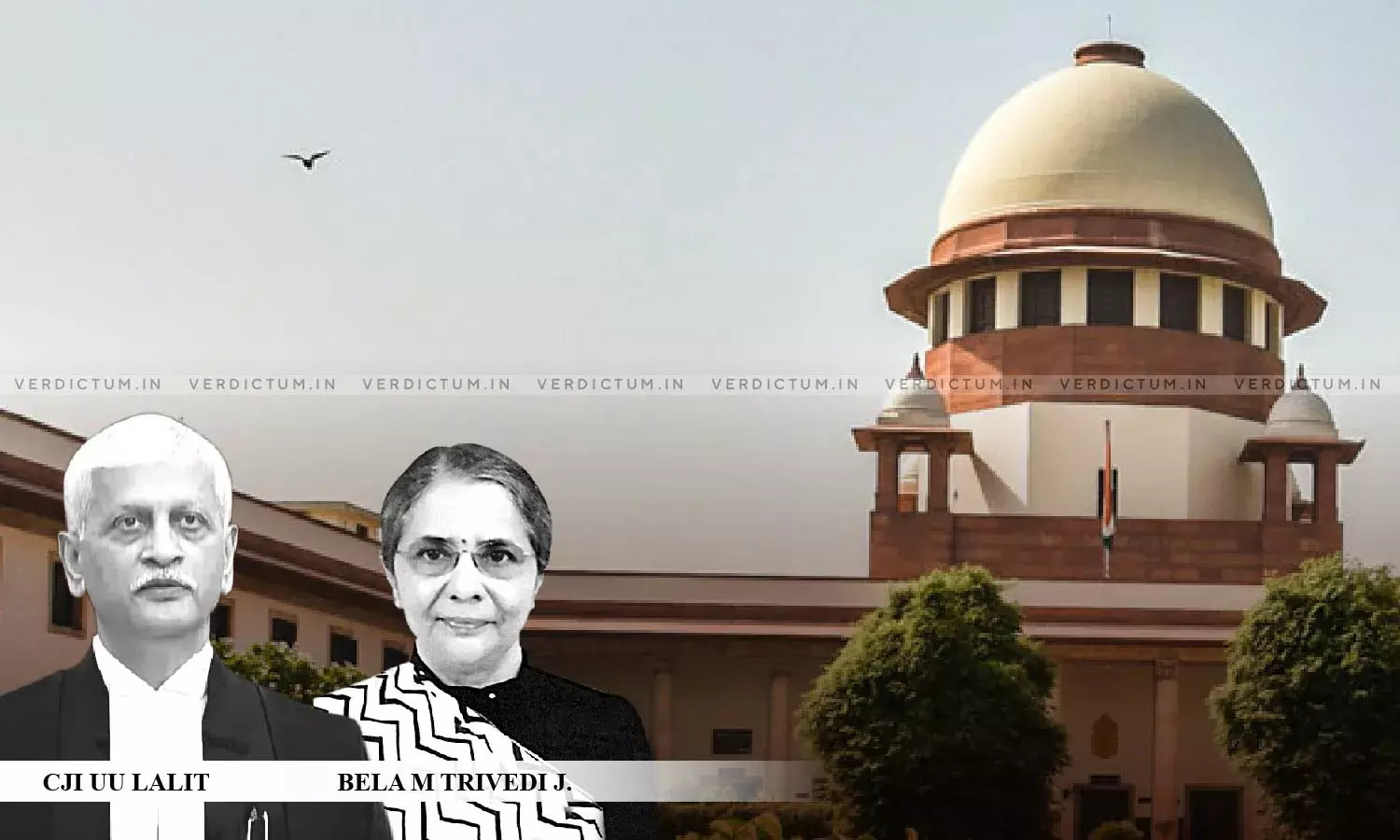Allegations Of Illegitimate Relationship Against Army Officer: SC Holds General Court Martial Trial To Be Time Barred

The Supreme Court in an appeal held that the trial done by the General Court Martial was clearly beyond three years and hence, barred under Section 122 of the Army Act, 1950.
The Bench comprising CJI Uday Umesh Lalit and Justice Bela M. Trivedi was dealing with an appeal filed by the Colonel under Section 30(1) of the Armed Forces Tribunal Act, 2007 against the judgment and order passed by the Court No. 2 Armed Forces Tribunal, Principal Bench, New Delhi. The Bench stated –
"In that view of the matter, the submission of the learned senior advocate appearing for the respondents that date of aggrieved person's knowledge about the commission of the alleged offence by the appellant, should be construed as the date when the respondents prima facie concluded after the Court of Inquiry that the appellant had committed the offence, cannot be accepted."
The Bench further held –
"The Convening Authority having directed the trial by General Court Martial vide order dated 22.11.2018, the same was clearly beyond three years and therefore barred under Section 122 of the Act. We are therefore of the opinion that the trial by the General Court Martial directed vide the order dated 22.11.2018 was clearly barred under Section 122 of the Army Act. The said proceedings deserve to be quashed and set aside and are accordingly set aside."
Advocate Sarvesh Singh appeared on behalf of the appellant.
Senior Advocate R. Balasubramanian represented the respondents.
Brief Facts of the case –
The appellant was commissioned as an officer in the Indian Army in 14 battalion of the Rajputana Rifles (Infantry) in the year 1996. On August 13, 2015, Col. Ramneesh Pal Singh, a close friend of the appellant wrote a letter to Brig. Ajay Vig that the appellant has been sending indecent messages to his wife that are sexually explicit in nature and that there is reasonable cause to believe that both have indulged in an illegitimate physical relationship. It was also stated in the letter that he intends to initiate divorce proceedings in a Civil Court based on the charges of infidelity and there must a proper inquiry into such an incident and take up a case for disciplinary action against the appellant.
Thereafter, a Court of inquiry was conducted by the HQ Delhi Area to investigate into such a complaint made by the Colonel. Such a court of inquiry was finalised in the year 2016 with the directions of GOC Delhi Area to initiate disciplinary proceedings against the appellant. The directions were given for recording the Summary of Evidence and on the completion of the same, three charges were framed against the appellant about him having behaved in the manner unbecoming his position and character expected of him, under Section 45 of the Army Act. Accordingly, on November 22, 2018, the Convening Authority directed a trial by General Court Martial.
The appellant wrote a letter to the Convening Authority raising an issue pertaining to the period of limitation in terms of Section 122 of the Army Act but he advised to raise the issue before GCM. The appellant then filed an application before the Tribunal challenging the charge sheet and order but the same got dismissed by the Tribunal. Hence, being aggrieved by such a decision, the appellant filed an appeal before the Supreme Court.
The Apex Court while referring to Section 122 of the Act noted –
"From the bare reading of the said provision, it clearly transpires that no trial by Court Martial of any person subject to the Army Act, for any offence could be commenced after the expiration of a period of three years, and such period would commence on the date of offence or where the commission of the offence was not known to the person aggrieved by the offence or to the authority competent to initiate action, the first day on which such offence comes to the knowledge of such person or authority, whichever is earlier."
The Court in the above context further noted that "In the instant case, having regard to the contents of the letter dated 13.08.2015 written by the aggrieved person i.e., Col. Ramneesh Singh to the concerned authority, it clearly transpires that he was aware of the alleged act of the appellant having stolen the affection of his wife on the date of the said letter. … Therefore, the date 13.08.2015 would be the crucial date on which the aggrieved person had the knowledge about the commission of the alleged offence. Therefore the time had started running from the said date for the purpose of Section 122 of the said Act."
The Supreme Court concluded –
"It is therefore clarified that the disciplinary proceedings initiated against the appellant pursuant to the chargesheet issued on 19.11.2018 shall continue in accordance with law."
Accordingly, the Court partly allowed the appeal.
Cause Title – IC-56663X Col Anil Kumar Gupta v. Union of India & Ors.
Click here to read/download the Judgment


